Aromatherapy oils offer significant benefits for relaxation and mood enhancement. They promote stress relief, improve sleep quality, and elevate emotional well-being. Key oils like lavender and chamomile provide calming effects, while citrus oils uplift mood. Understanding their unique properties and cultural perceptions can enhance their effectiveness in daily routines and self-care practices.
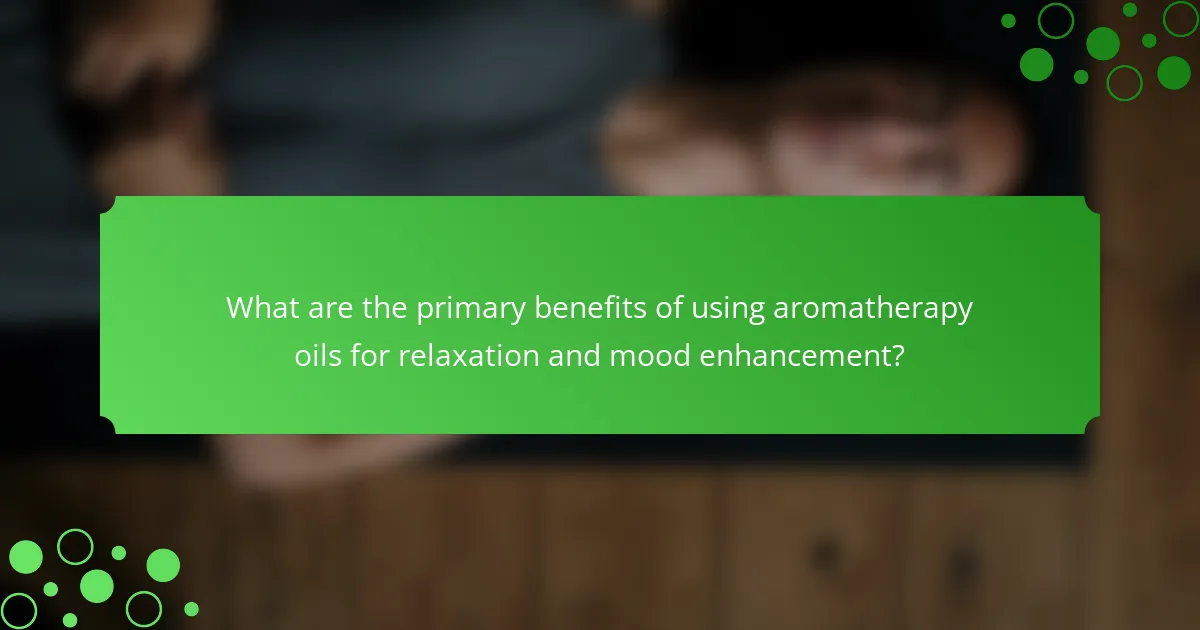
What are the primary benefits of using aromatherapy oils for relaxation and mood enhancement?
Aromatherapy oils provide significant benefits for relaxation and mood enhancement. They promote stress relief, improve sleep quality, and elevate overall emotional well-being.
Essential oils like lavender and chamomile are known for their calming effects, while citrus oils can uplift mood. Studies show that inhaling these scents can lower cortisol levels, reducing anxiety.
Using aromatherapy oils in a diffuser or during massage enhances their effectiveness, creating a soothing environment. Regular use can lead to improved mental clarity and emotional balance.
How do aromatherapy oils affect mental well-being?
Aromatherapy oils positively influence mental well-being by promoting relaxation and enhancing mood. Essential oils like lavender and chamomile reduce anxiety and stress levels. Research indicates that inhaling these oils can lower cortisol, the stress hormone. Additionally, oils such as citrus and peppermint uplift mood and increase energy.
Which specific oils are most effective for stress relief?
Lavender, chamomile, bergamot, ylang-ylang, and frankincense are among the most effective oils for stress relief. Lavender oil is well-known for its calming properties, reducing anxiety and promoting sleep. Chamomile oil aids relaxation and enhances mood. Bergamot oil uplifts spirits and alleviates tension. Ylang-ylang oil balances emotions and reduces stress levels. Frankincense oil promotes a sense of peace and tranquility. Each oil offers unique benefits that contribute to overall stress reduction.
What scientific evidence supports the use of aromatherapy for mood enhancement?
Scientific evidence supports aromatherapy’s effectiveness in enhancing mood through various studies. Essential oils like lavender and bergamot have shown significant effects on reducing anxiety and improving emotional well-being. For instance, a study published in the Journal of Alternative and Complementary Medicine found that inhaling lavender oil significantly decreased anxiety levels in participants. Another research highlighted bergamot’s ability to lower stress hormones, promoting relaxation. These findings indicate that specific aromatherapy oils can positively influence mood and emotional states.
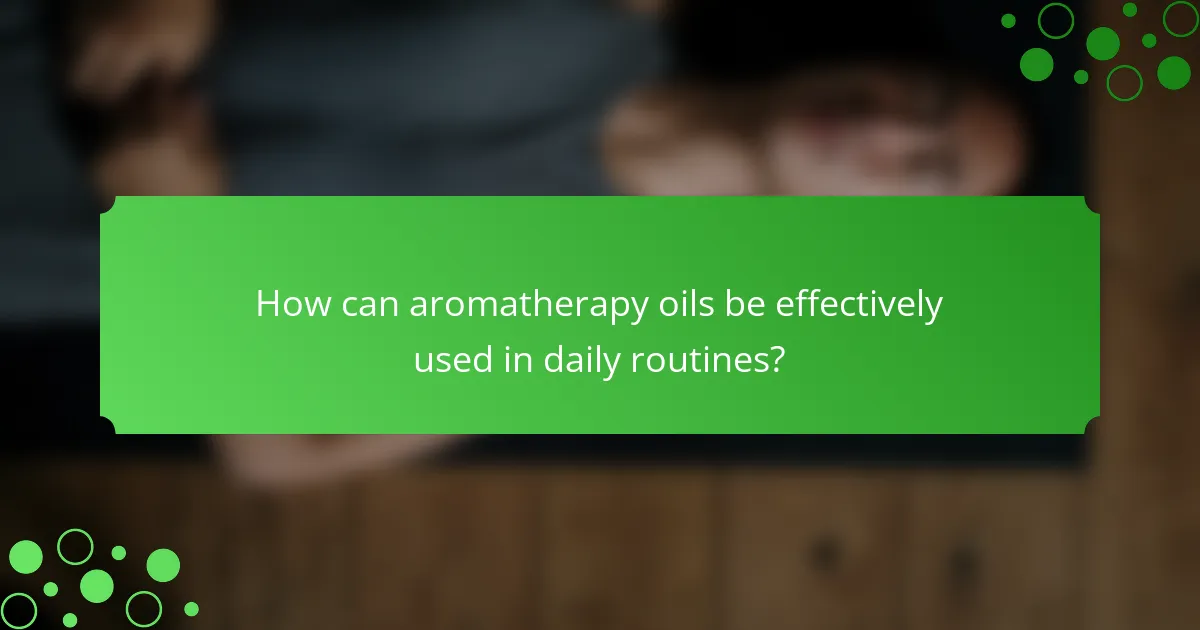
How can aromatherapy oils be effectively used in daily routines?
Aromatherapy oils can enhance daily routines by promoting relaxation and improving mood. Incorporating oils like lavender or chamomile into evening rituals can reduce stress and improve sleep quality. Diffusing essential oils in living spaces creates a calming atmosphere, beneficial for both work and leisure. Applying oils topically, diluted with a carrier oil, can offer immediate stress relief during busy days. Lastly, using oils in baths or massages can deepen relaxation, making them effective tools for self-care.
What are the best methods for applying aromatherapy oils?
The best methods for applying aromatherapy oils include diffusion, topical application, and inhalation. Diffusion disperses essential oils into the air, enhancing relaxation and mood. Topical application involves diluting oils with a carrier and applying them to the skin, providing localized benefits. Inhalation allows for immediate effects through direct breathing of the oils, promoting calmness and emotional balance. Each method can be tailored to individual preferences for optimal relaxation and mood enhancement.
How can aromatherapy oils be incorporated into meditation practices?
Aromatherapy oils can enhance meditation by promoting relaxation and focus. Essential oils like lavender, chamomile, and sandalwood can create a calming atmosphere.
1. Choose the right oil: Select oils that resonate with your desired mood.
2. Diffusion: Use a diffuser to disperse the scent in your meditation space.
3. Application: Apply oils to pulse points or use in a massage before meditation.
4. Inhale: Deeply inhale the aroma before and during meditation to deepen relaxation.
5. Combine with techniques: Use oils alongside breathing exercises or visualization to enhance the experience.
Incorporating aromatherapy oils can significantly improve the quality of meditation, fostering a deeper connection to the practice.
What safety precautions should be taken when using aromatherapy oils?
When using aromatherapy oils, ensure safety by following key precautions. Store oils away from children and pets. Always perform a patch test before use to check for skin reactions. Dilute essential oils with a carrier oil to prevent irritation. Avoid using oils near sensitive areas like eyes and mucous membranes. Consult a healthcare professional if pregnant, nursing, or on medication.
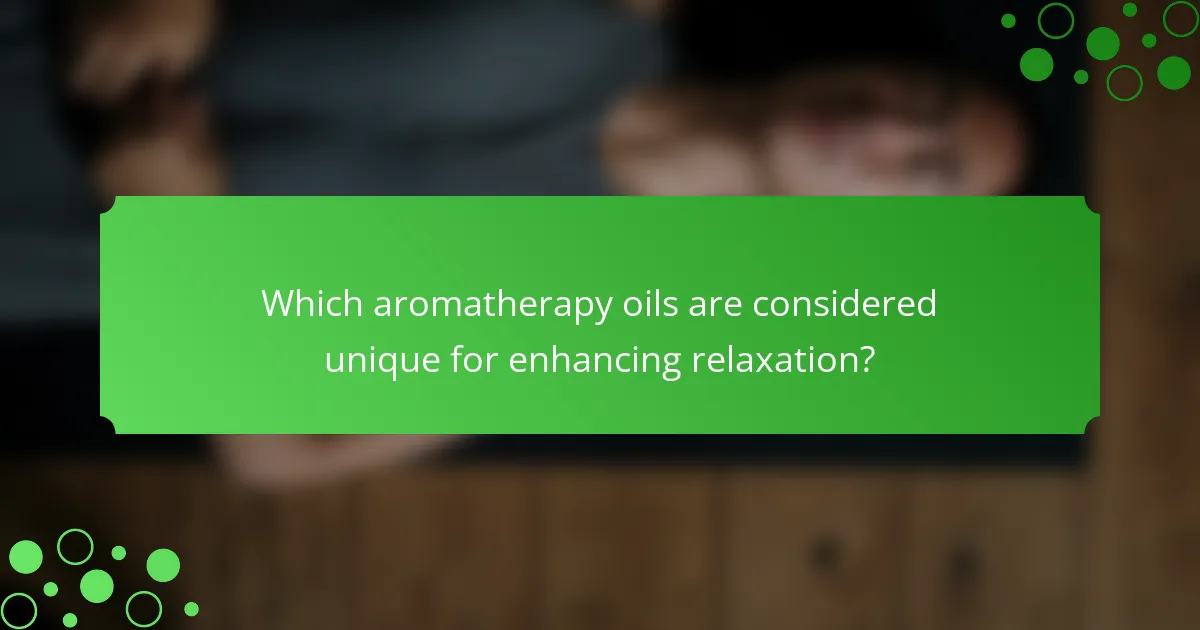
Which aromatherapy oils are considered unique for enhancing relaxation?
Lavender, chamomile, ylang-ylang, bergamot, and frankincense are unique aromatherapy oils known for enhancing relaxation. Each oil possesses distinct properties that contribute to a calming atmosphere.
Lavender oil is renowned for its soothing effects, often reducing anxiety and promoting sleep. Chamomile oil has a gentle aroma that can alleviate stress and enhance tranquility. Ylang-ylang oil is celebrated for its ability to uplift mood while inducing relaxation. Bergamot oil uniquely combines citrus freshness with calming properties, making it effective for reducing tension. Frankincense oil, with its rich, earthy scent, is used to deepen meditation and enhance emotional well-being.
These oils can be used in diffusers, added to baths, or blended with carrier oils for massage, providing versatile options for relaxation.
What differentiates lavender oil from other calming oils?
Lavender oil is distinct from other calming oils due to its unique chemical composition and versatile applications. Its primary calming component, linalool, is known for its ability to reduce anxiety and promote sleep. Unlike oils like chamomile or bergamot, lavender oil has a broader range of benefits, including pain relief and skin healing properties. Additionally, its aroma is universally appealing and can be used in various forms, such as diffusers, topical applications, and bath products, enhancing its accessibility for relaxation and mood enhancement.
How does chamomile oil uniquely contribute to mood enhancement?
Chamomile oil uniquely contributes to mood enhancement by promoting relaxation and reducing anxiety. Its calming properties stem from unique compounds like bisabolol and chamazulene, which influence neurotransmitter activity. Studies indicate that inhaling chamomile oil can lower stress hormone levels, leading to improved emotional well-being. Regular use may enhance sleep quality, further supporting mood stability.

What are some rare aromatherapy oils that offer unique benefits?
Some rare aromatherapy oils provide unique benefits for relaxation and mood enhancement. These oils include Blue Tansy, which offers anti-inflammatory properties; Spikenard, known for its calming effects; and Helichrysum, recognized for its skin healing benefits. Each oil presents distinct characteristics that enhance overall well-being.
What is the significance of bergamot oil in aromatherapy?
Bergamot oil is significant in aromatherapy for its uplifting and calming properties. It enhances mood and reduces stress, making it ideal for relaxation. The unique attribute of bergamot oil is its ability to balance emotions while promoting a sense of well-being. Studies indicate that inhaling its scent can lower anxiety levels and improve overall mental health.
How does ylang-ylang oil enhance emotional balance?
Ylang-ylang oil enhances emotional balance by promoting relaxation and reducing anxiety. Its sweet, floral aroma can elevate mood and alleviate stress. Studies show that inhaling ylang-ylang oil can lower cortisol levels, leading to improved emotional stability. Additionally, its calming properties can help with insomnia, allowing for better overall mental health.
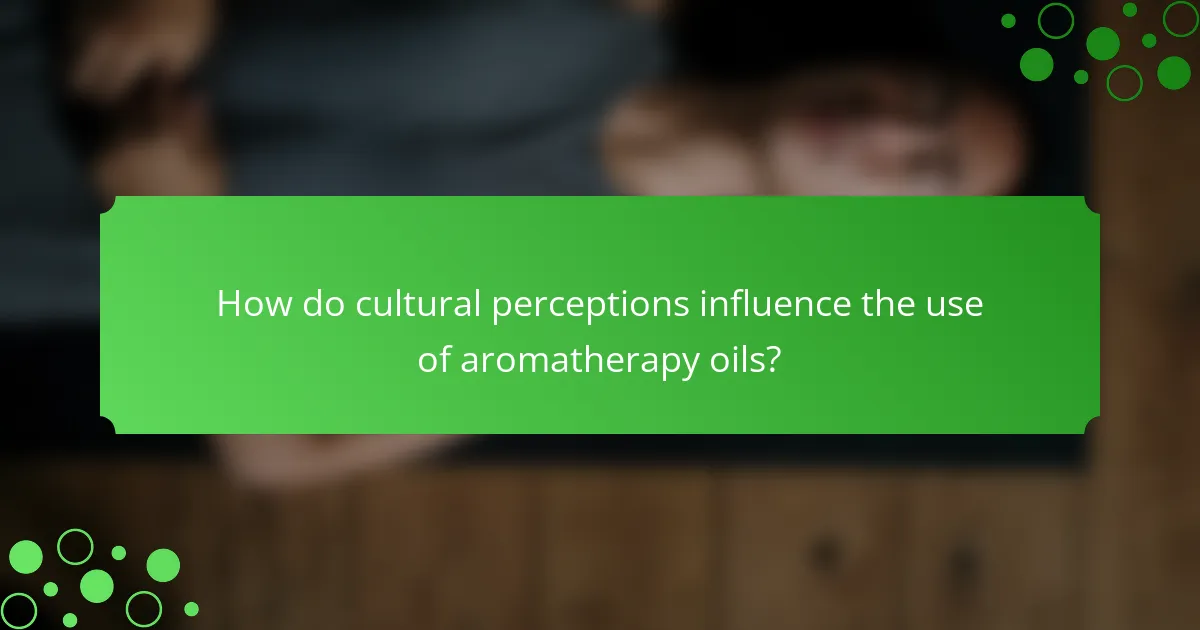
How do cultural perceptions influence the use of aromatherapy oils?
Cultural perceptions significantly shape how aromatherapy oils are utilized for relaxation and mood enhancement. Different cultures associate specific scents with particular emotions and healing practices. For instance, lavender is widely recognized in Western cultures for its calming properties, while sandalwood is revered in Eastern traditions for its grounding effects.
These cultural backgrounds influence preferences for certain oils, impacting their popularity and usage. In Japan, for example, the practice of Shinrin-yoku, or forest bathing, incorporates essential oils from native plants to enhance relaxation. As a result, cultural context drives the selection and application of aromatherapy oils, making them more effective for individuals who resonate with those traditions.
What regional preferences exist for specific aromatherapy oils?
Regional preferences for specific aromatherapy oils vary widely based on cultural practices and availability. In Europe, lavender oil is favored for relaxation, while in Asia, eucalyptus oil is often used for its invigorating properties. North America shows a preference for citrus oils like orange and lemon for mood enhancement. In the Middle East, frankincense is highly valued for its calming effects. Each region’s preference reflects local traditions and the unique benefits attributed to these oils.
How do traditions shape the application of aromatherapy in different cultures?
Traditions significantly influence how aromatherapy is practiced across cultures. Different societies incorporate unique oils and rituals that reflect their values and beliefs. For instance, in ancient Egypt, essential oils were used in religious ceremonies, while in Japan, the practice of Shinrin-yoku emphasizes the calming effects of nature through aromatherapy.
Cultural context shapes the selection of oils; lavender may be favored in Western cultures for relaxation, whereas sandalwood is often preferred in Indian practices for its spiritual significance. Additionally, the methods of application vary, with some cultures favoring diffusers and others using topical applications or inhalation techniques.
The historical significance of certain oils also plays a role. For example, frankincense has deep roots in Middle Eastern traditions, often associated with meditation and spiritual cleansing. These cultural nuances create a rich tapestry of aromatherapy practices tailored to specific societal needs and preferences.
Overall, the intersection of tradition and aromatherapy highlights the diverse approaches to relaxation and mood enhancement, demonstrating how cultural heritage shapes holistic wellness practices.
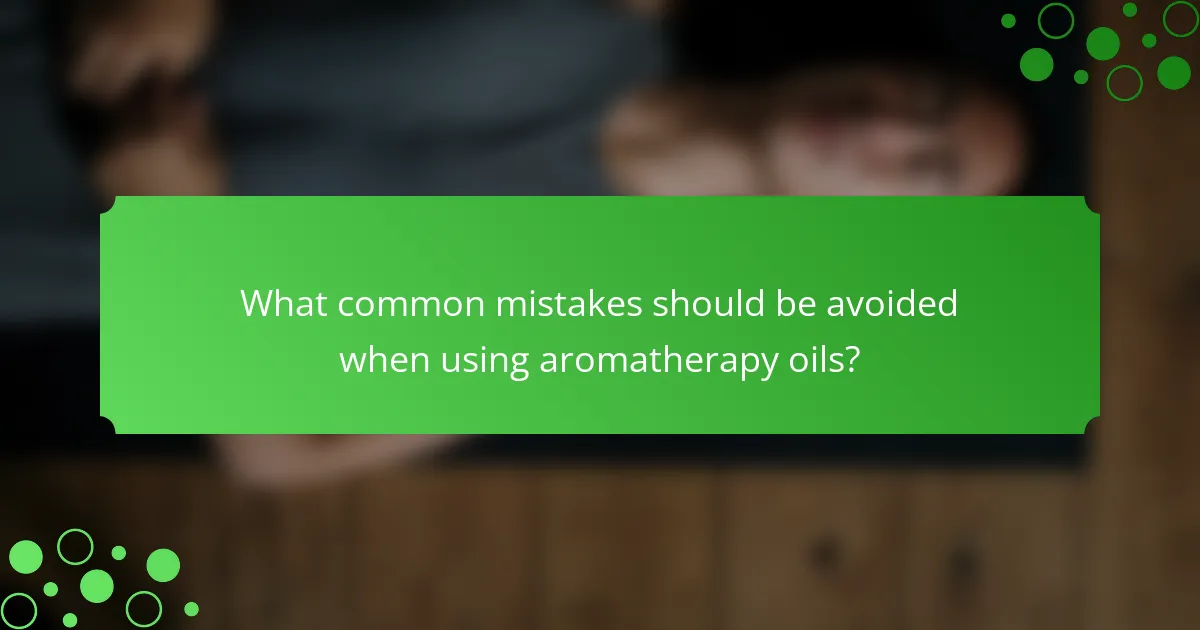
What common mistakes should be avoided when using aromatherapy oils?
Avoiding common mistakes when using aromatherapy oils enhances relaxation and mood. Key mistakes include using oils undiluted, neglecting skin sensitivity tests, and assuming all oils are safe for everyone.
1. Using undiluted oils can cause skin irritation or allergic reactions. Always dilute essential oils with a carrier oil before application.
2. Failing to conduct a patch test may lead to unexpected reactions. Test a small amount on your skin to check for sensitivity.
3. Overlooking individual health conditions can be dangerous. Consult a healthcare provider if you have allergies, pregnancy, or chronic conditions.
4. Ignoring quality can diminish benefits. Choose high-quality, pure essential oils for effective results.
5. Misunderstanding oil properties may lead to ineffective use. Research each oil’s unique attributes for specific mood enhancement.
How can users ensure they are selecting high-quality oils?
To ensure high-quality aromatherapy oils, users should prioritize pure, organic sources and check for third-party testing. Look for oils with clear labeling, including botanical names and extraction methods. Additionally, consider the oil’s aroma and consistency; high-quality oils have strong scents and appropriate viscosity.
What are the misconceptions surrounding the effectiveness of aromatherapy oils?
Many misconceptions exist about the effectiveness of aromatherapy oils for relaxation and mood enhancement. Some believe these oils are a cure-all, while others doubt their benefits entirely. Scientific studies show that aromatherapy can reduce anxiety and improve mood, but effects vary by individual and oil type. Misunderstandings often stem from anecdotal claims lacking rigorous evidence. Additionally, the quality of oils significantly influences their effectiveness, with pure, high-quality oils yielding better results than synthetic alternatives. Understanding these factors can help clarify the true potential of aromatherapy oils.
What expert tips can enhance the benefits of aromatherapy oils?
To enhance the benefits of aromatherapy oils, focus on proper application techniques and environment. Use a diffuser to disperse oils evenly, ensuring consistent exposure. Choose calming scents like lavender or chamomile, which promote relaxation. Combine oils for synergistic effects; for instance, mixing eucalyptus with peppermint can invigorate the senses. Additionally, consider the timing of use; applying oils during meditation or yoga can deepen the experience. Always dilute essential oils with a carrier oil before skin application to prevent irritation.